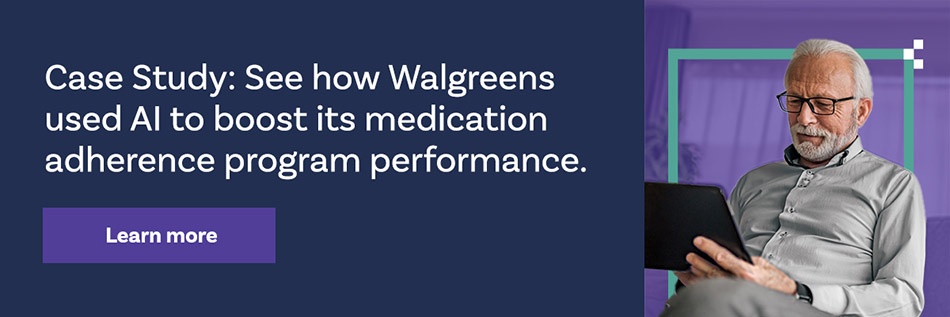One of the greatest challenges for pharmaceutical and healthcare organizations is effective patient engagement.
Medication adherence rates for most chronic disease medications hover around 50-60 percent. This results in sky-high healthcare costs and preventable morbidity or mortality.
Patient intervention programs, sometimes called Patient Support Programs (PSPs), can promote adherence, but the approach is critical.
The tactics may be effective in some circumstances, but the right tactics in any individual scenario often depend on who is overseeing the program. Healthcare and pharmaceutical companies have different goals, levels of patient access, and options for supporting patient medication compliance. Interventions need to be personalized, case-by-case.
So, what does the evidence show about successful, tailored adherence interventions?
Pharmaceutical Interventions
Pharmaceutical companies don’t typically have access to the detailed patient data available to pharmacies, providers, and payers. Because of this, their PSPs are usually brand-focused, educating patients about a drug, condition, or encouraging access. Patient engagement call centers are the most popular option.
Dan Sontupe, the associate partner and manager of The Bloc’s Value Builders, says pharma companies can drive adherence by promoting patient health. His marketing agency partnered with the Commission for Case Manager Certification to create ‘brand-agnostic’ case management tool kits that help ‘pharma manufacturers meet patients where they are with materials to help support disease control and health-management goals.’
What’s more, he also advises that, ‘emails, texts, Facebook messages, and tweets provide further avenues for all-encompassing patient engagement, especially when used within an omni-channel framework.
Pharmacy Interventions
Pharmacists are in a unique position to develop meaningful relationships with patients and tap into that sense of trust to encourage medication adherence. Face-to-face counseling, text messages, simplified medication regimes, and motivational interviews can all contribute to patient medication adherence.
Pharmacies can also support this effort by minimizing adverse effects, thereby improving clinical quality measures. This includes counseling patients about their medications and advising when a medication may be unnecessary or harmful. Adherence packaging and strategies to promote medication access, such as prescription drug cards, may also help.
At every stage and no matter the tactic, the aim is always to maintain a blame-free environment. Patients who are non-adherent with medication do not do so on purpose; after all, they are the ones who suffer the consequences. Pharmacists are collaborators and counselors, and must instead listen to patients’ concerns and hardships, then develop ways to overcome them with the patient.
In-person patient education proved effective in the Asheville Project, a long-term cohort study set in 12 community pharmacies in Asheville, North Carolina. The program used in-person pharmacist education to improve adherence in patients with diabetes, ultimately leading to improved clinical outcomes, reduced adverse events, and decreased costs.

Payer Interventions
Payers can incentivize pharmacies to use the above intervention tactics, but they can also target providers and patients.
For example, a study in the Journal of Managed Care & Specialty Pharmacy looked at how a multi-channel adherence intervention affected members’ medication adherence and health plan quality performance measures for two Medicare Advantage Part D plans. The intervention included a daily prescriber-directed 90-day retail refill component and a weekly member-directed refill reminder component.
For the 90-day refill component, form prescription letters were sent by fax to prescribers of members who had filled a 30-day prescription. If their prescribers approved the refill, members were notified that a 90-day refill was available at their retail pharmacies.
For the weekly refill reminder, weekly scans of pharmacy claims were used to identify members’ refills patterns. Members who were seven days late received the letter. The study found adherence improvement for both plans using these interventions.
Blue Cross Blue Shield Arizona (BCBSAZ) began using text messages in 2019 to support patients with cardiovascular disease, respiratory disease, and diabetes, covering 13 drugs in total. As an added incentive, members using the messaging program who fill their prescriptions on time receive $45 to $50 off their copay.
Maximize Your Patient Interventions with AllazoHealth’s AI
AllazoHealth’s artificial intelligence (AI) technology proactively empowers patient interventions, regardless of which tactics pharmaceutical companies, pharmacies, and payers utilize – predicting patients’ risk levels of non-adherence, personalizing communication, and maximizing engagement and outcomes.
The most impactful, cost-efficient programs target smaller groups of patients at higher risk, rather than an entire patient population. For example, research shows that certain chronic conditions have lower compliance rates.
The AI accurately predicts which patients are at risk for non-adherence or other gaps in therapy, drawing on identified data and past patient behavior. It then identifies which patients are most likely to respond to which interventions and recommends personalized outreach by channel, content, timing, and cadence all to drive maximized engagement for better patient medication behaviors and outcomes.
Learn how you can use AllazoHealth’s award winning AI to strengthen your patient engagement and medication adherence, improving patient outcomes and increasing revenue in the process.

